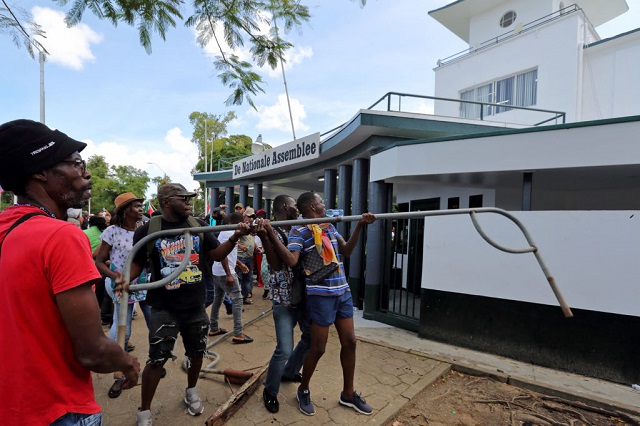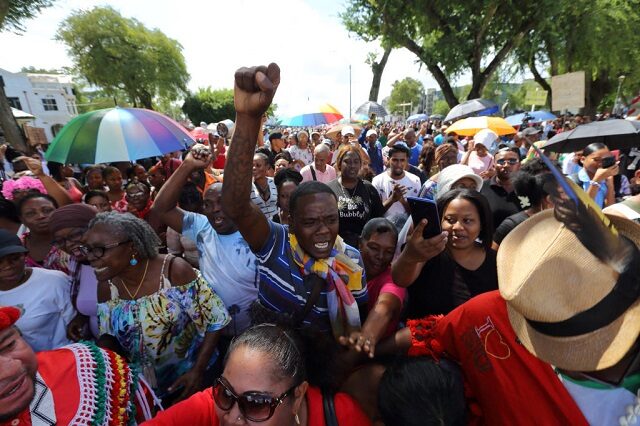Hundreds of demonstrators clashed with police on Friday in Paramaribo, the capital of Suriname. Several dozen of the protesters were able to force their way into the National Assembly building, but were driven back with tear gas, while others burned and looted shops across the city.
The United Nations expressed concerns on Monday that more violence could be in store, possibly building into an effort to overthrow President Chandrikapersad Santokhi.
The riot began as a large, relatively orderly rally with thousands of participants who were angered by rising food, gas, and electricity prices, and by austerity measures imposed as part of a deal Santokhi’s government made with the International Monetary Fund (IMF) last summer.

Demonstration against austerity measures in Paramaribo, Suriname, February 17 2023. (Photo by RANU ABHELAKH/AFP via Getty Images)
The IMF was concerned that high levels of government spending during an economic downturn were making inflation worse. In early February, the Suriname government announced it would phase out expensive subsidies for fuel and electricity in a two-stage process.
“It is not sustainable to continue the subsidies we give,” Finance Minister Stanley Raghoebarsing explained at a press conference on February 6. “That is something that we cannot afford. It costs more than two billion SRD [Surinamese dollars] a year. Our taxpayers and our state apparatus cannot afford that. That needs to be adjusted.”
The phase-out plan angered citizens who had come to depend on subsidized energy, especially with inflation driving up the cost of living. Critics accused the Santokhi government of corruption and insisted a more honest administration could find ways of balancing the budget without raising costs for the impoverished population.
Another factor in the anti-government protests was the departure from the government of the smallest party in Santokhi’s coalition, the Suriname National Party (NPS). The party withdrew from the alliance that won Santokhi the presidency in 2020 because it felt excluded from the decision-making process, especially after the president sacked two ministers from NPS.
NPS was strongly opposed to cutting the energy subsidies, warning that rising fuel costs would push more Surinamese into poverty.
NPS was also highly critical of top Santokhi officials for giving plum government jobs to their friends and relatives, a critique that resonated with much of the public. With the departure of NPS from Santokhi’s coalition, Surinamese opposed to the subsidy cuts evidently felt they were losing their voice in Paramaribo.
The Friday demonstration turned violent as a portion of the roughly 2,000 protesters threw rocks and bottles at police, vandalized and robbed stores in Paramaribo, and eventually forced their way into parliamentary headquarters. Suriname’s economic ministry had advised business owners to shut down on Friday and Saturday in anticipation of unrest.
SURINAME — Looting and violence amid the chaos after anti-government protesters stormed Suriname's parliament pic.twitter.com/e85TtV7yPV
— Citizen Free Press (@CitizenFreePres) February 18, 2023
Law enforcement officials said 19 were injured during Friday’s brawls and 143 were arrested, with about half of them released soon afterward.
Santokhi delivered an address to the nation on Sunday in which he said “the economy should be normalized as quickly as possible” by restoring order.
“We acknowledge that the sense of security as a result of the eruptions surrounding the protest has been seriously affected. It has therefore been decided to boost security. Increased patrols have been carried out on several roads in recent days. That will continue,” he said.
Santokhi announced that a task force has been established to hunt down the organizers of the attack on the National Assembly building.
“We have the images. It is only a matter of time before you are apprehended,” Justice Minister Kenneth Amoksi said at a press conference on Saturday, inviting protest leader Stephano Biervliet to surrender himself to the police.
Biervliet, as it happens, was running a livestream on Facebook at the same time as Amoksi’s press conference. He claimed he was held hostage by unknown gunmen during the protest, which spun wildly out of control without his guidance.
“What happened was not my intention. It was a peaceful protest action that was taken over by malicious parties in an organized context,” Biervliet said.
Video here pic.twitter.com/sp1cVJbFWe
— Populism Updates (@PopulismUpdates) February 17, 2023
According to the watchdog site Netblocks, Suriname’s government began restricting access to social media on Friday night, including Facebook, Instagram, WhatsApp, and Messenger. Netblocks observed that such censorship is “considered exceptional for the South American nation,” which does not have a history of Internet shutdowns or throttling.
The U.S. Embassy in Paramaribo swiftly condemned the riot on Friday, denouncing the invasion of the National Assembly building as an “unacceptable assault on democracy” while supporting “the right to peaceful protest and respect for the rule of law.”
The CARICOM trade bloc issued a statement from its summit in the Bahamas that “strongly condemned the violent attacks on people as well as private and public facilities, including the Parliament.”
“CARICOM stands in solidarity with all law-abiding citizens of Suriname and urges all concerned to make every effort to maintain public safety. All efforts must be made to restore calm as a matter of urgency,” the statement said.
“We stand in solidarity in recognizing the democratically elected government led by President Santokhi and we do hope that all actors can respect the rule of law and respect people’s rights to move freely, and we certainly condemn the storming of the Parliament,” said Dominican Prime Minister Roosevelt Skerrit at the closing press conference of the CARICOM summit.
Skerrit compared the storming of the Surinamese National Assembly to the January 6 riot at the U.S. Capitol and unrest in Brazil following the defeat of President Jair Bolsonaro.
“It appears this is becoming a practice in our hemisphere and something we all need to seek to condemn and stamp out,” he said.
U.N. Secretary-General Antonio Guterres said on Sunday that he was “concerned about the violent protests,” especially the breach of the National Assembly, damage to private property, and injuries sustained by civilians and police.
A statement from Guterres’ office stressed the importance of peaceful assembly and free expression, but added that “protests must be carried out without resorting to violence.”
“The Secretary-General urges all relevant actors in Suriname to show restraint and engage in inclusive dialogue to address constructively the challenges facing the country,” the statement said.

COMMENTS
Please let us know if you're having issues with commenting.